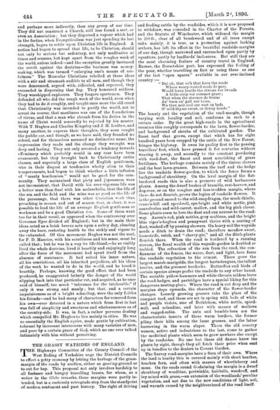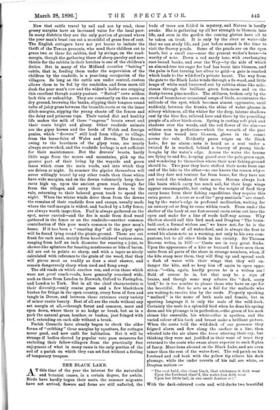THE GRASSY WAYSIDES OF ENGLAND.
THE Highways Committee of the County Council of the West Riding of Yorkshire urge the District Councils to effect a petty economy by letting the herbage of the grass- margin of the roads by auction, either as grazing-ground or to out for hay. This proposal not only involves hardship to all footsore and hungry travelling beasts, for whom, as a writer in the Globe remarks, these margins were partly in- tended, but is a curiously retrograde step from the standpoint a modern sentiment and past history. The right of driving
and feeding cattle by the roadsides, which it is now proposed to withdraw, was conceded in the Charter of the Forests, and the Statute of Winchester, which widened the margin to 200 ft., clear of all brushwood and of all trees except oaks, mainly, it is true, as a protection against lurking archers, has left its effect in the beautiful roadside-margins of our day, though narrowed and encroached upon partly by squatters, partly by landlords' inclosures. But still they are the most charming feature of country travel in England. Barnes, the Dorsetshire poet, has expressed the feeling of the poor, whether travelling on foot or using these as one of the last "open spaces" available in our over-inclosed country :—
"But oh, that vo'k that have the roads
Where weary-rooted souls do pass, Would leave bezide the stwone vor breads
A. little strip vor zummer grass ;
That when the stwones do bruise An' burn an' gall our tooes, We then mid cool our veet on beds 0' wild-thyme sweet, or deitisy heads."
The beauty and the vegetation of the road-margin, though varying with locality and soil, conforms in each to a certain order. By the great high-roads in the agricultural counties this roughly corresponds to the lawn, flower-border, and background of shrubs of the cultivated garden. The finest turf that grows, except that which has for eight hundred years been cropped by the cattle of the New Forest, fringes the highway. It owes its quality first to the passing travellers' feet, which have pressed it for centuries without wearing it away, and secondly to the constant powdering with road-dust, the finest and most nourishing of grass fertilisers. The herbage consists mainly of the tiniest clovers and the best lawn-grasses. Between the turf and the hedge lies the roadside flower-garden, to which the fence forms a background of shrubbery. On the level margin of the flat- bordered roads this is also a preserve of wild herbaceous plants. Among the dwarf bushes of bramble, rest-harrow, and dog-rose, or on the rougher and less-trodden margin, where these do not flourish, grows the legion of roadside flowers. It is the ground sacred to the wild-snapdragon, the musk-thistle, crane's-bill and speedwell, eye-bright and white nettle, pink convolvalus and wild-carrot, mallow, and the big pink clover. Some plants seem to love the dust and sun nearest to the road- way. Aaron's rod, pink nettles, grey scabious, and the bright blue viper's-bugloss and pennywort thrive with a coating of dust, washed off by passing showers. On heavy soil the wayside needs a ditch to drain the road; therefore meadow.sweet, loosestrife, vetch, and "cherry-pie," and all the ditch-plants flourish there. When the road is bordered by a running stream, the floral wealth of this wayside-garden is doubled or trebled. The refraction of the sun from the road, the con- finement of the fences, the water, dust, and light, here force the roadside vegetation to the utmost. There grow the
largest marsh-marigolds, the longest harts-tongues, the tallest teazles, and the greenest burdocks. Butterflies and birds of
certain species always prefer the roadside to any other haunt. The sociable yellow-hammers and white-throats seldom leave the road-hedges, and partridges have a special liking for this dangerous nesting-place. Where the road is cut deep and the margins slope upwards, the character of the flower-border changes. Loosely growing grasses take the place of the compact turf, and these are set in spring with beds of white and purple violets, star of Bethlehem, white nettle, speed- well, and celandine, and later with masses of mallows and ragged-robin. The ants and bumble-bees are the characteristic insects of these warm borders, the former piling their hills among the loose grasses, and the latter burrowing in the warm slopes. There the old country women, active and industrious to the last, come to gather the medicinal plants which seem to grow nowhere else except by the roadsides. No one but these old dames know the plants by sight, though they all fetch their price when sent up in bundles to the dealers in Covent Garden.
The Surrey road-margins have a flora of their own. Where the land is heathy this is covered mainly with short heather, bracken fern, and often with masses of whortleberty and moss. On the roads round Godalming the margin is a dwarf shrubbery of woodbine, periwinkle, hairbells, woodruff, and ivy mixed with grass,—an extension of the woodland' peculiar vegetation, and not due to the new conditions of light, soil, and warmth caused by the neighbourhood of the road itself.
Now that cattle travel by rail and not by road, these grassy margins have an increased value for the local poor. In many districts they are the only portion of ground where the poor man's beast can eat a mouthful of grass free of cost. The English cottagers have not yet learnt to imitate the thrift of the Tuscan peasants, who send their children out to graze two or three fat rabbits, tied by strings, on the road- margin, though the gathering there of sheep-parsley and sow- -thistle for the rabbits in their hutches is one of the children's duties. But in many of the Midland counties "baiting" cattle, that is, feeding them under the supervision of the children by the roadside, is a year-long occupation of the -villagers. So long as the cattle are under control, custom -allows them to be fed by the roadsides, and from morn till dusk the poor man's cow and the widow's heifer are cropping this excellent though scanty pasture. 'Baited" cows seldom look thin or unhealthy. They are constantly on the move on -dry ground, browsing the banks, slipping their tongues round -tufts of juicy grass between the bramble-roots or on the inner ditch-margins, nipping the young shoots off the fences and the daisy and primrose tops. Their varied diet and healthy aife makes the milk of these " vagrom" beasts sweet and their coats bright and glossy. Other roadside animals are the gipsy horses and the herds of Welsh and foreign ponies, which " drovers " still lead from village to village, from the horse-fairs of Wales and Devon. The former, -owing to the heaviness of the gipsy vans, are nearly always overworked, and the roadside herbage is not sufficient for their maintenance. But the drovers' beasts, hardy little nags from the moors and mountains, pick up the greater part of their living by the wayside and green lanes which cross the main roads, and into which they are driven at night. In summer the gipsies themselves will never willingly travel by any other roads than those which have wide margins, and on the downs voluntarily keep their -carts high up, upon the ancient green road, though far from the villages, and carry their wares down to the vale, returning to their beloved green track to spend the night. When the winter winds drive them from the downs the remains of their roadside fires and camps, usually made where the turf-margin is widest, and backed by a lofty fence, are always worth inspection. Fuel is always gathered on the spot, never carried—and the fire is made from dead wood gathered in the fence or on the roadside—another common -contribution of this poor man's common to the poor man's home. If it has been a "roasting day" all the gipsy spits will be found lying round the picnic-ground. These are cut fresh for each meal, mainly from hazel-sticks of various sizes, ranging from half an inch diameter for roasting a joint, to skewer-like splinters for toasting mushrooms or bits of bacon. All are cut to points so sharp, and with a taper so nicely 'calculated with reference to the grain of the wood, that they will pierce meat as readily as does a steel skewer, and remain dangerously sharp when used and flung away.
The old roads on which coaches ran, and even those which were not great coach-roads, have generally remained wide, such as those from London to Norwich, Oxford to Faringdon, and London to York. But in all the chief characteristic is their diversity,—only coarse grass and a few blackthorn bushes for fringe in the open country, every form of fern and tangle in Devon, and between these extremes every variety of minor rustic beauty. Best of all are the roads without any set margin at all,—through forest and common, moor and open down, where there is no hedge or break, but as in a park the natural grass, heather, or bushes, just fringed with turf, extending on each side without a break.
Parish Councils have already begun to check the older forms of " cribbing " these margins by squatters, for cottages never good, and now unfit for habitation. But it will be strange if bodies elected by popular vote pass measures for excluding their fellow-villagers from the practically free enjoyment of what in many cases is the only portion of the soil of a parish on which they can set foot without a feeling of temporary trespass.







































 Previous page
Previous page